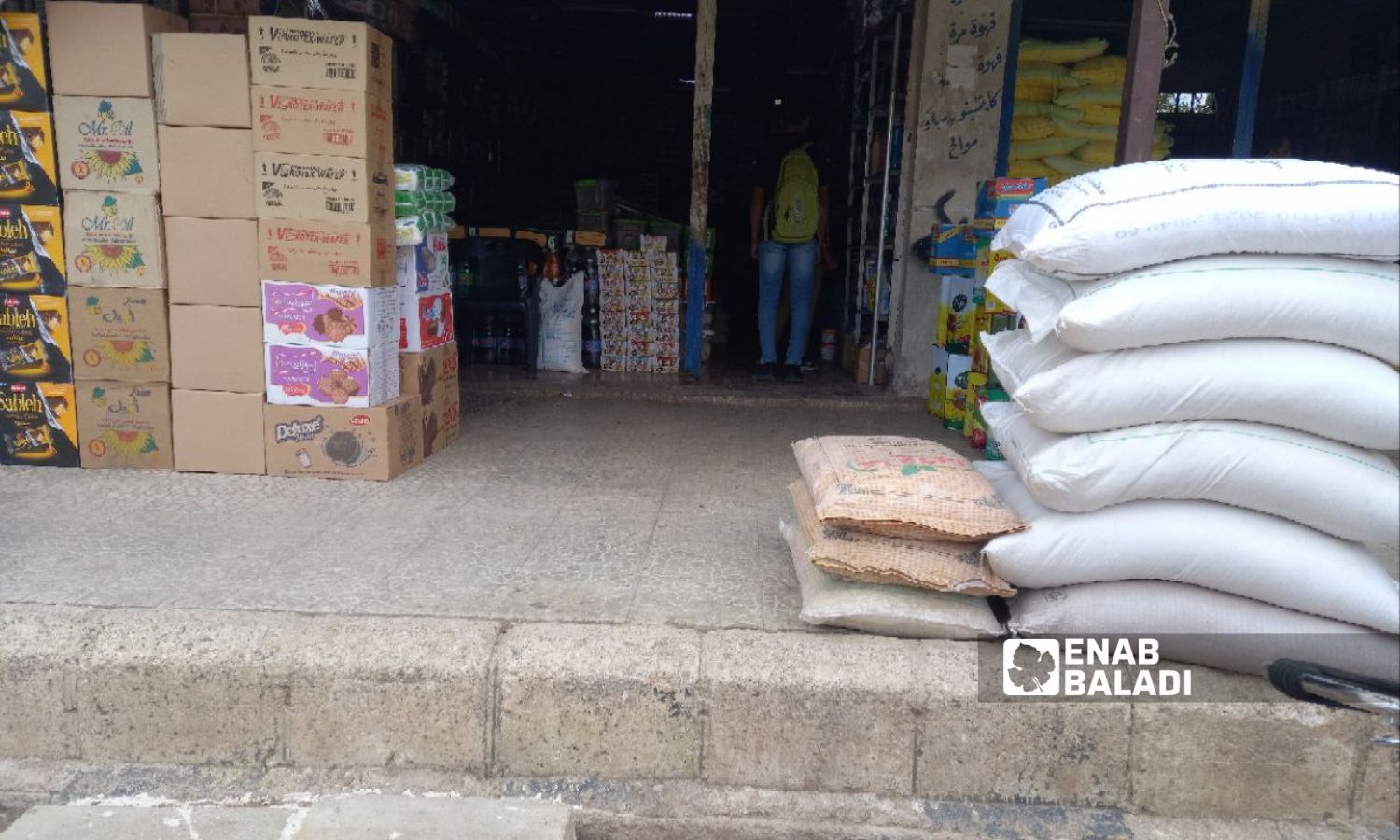



Daraa – Halim Muhammad
The residents of Daraa governorate used to receive the food basket provided by the World Food Programme (WFP) frequently within a period of time not exceeding two months.
In early July, the Daraa Provincial Council published a circular on its official Facebook page stipulating that delivery periods will be delayed for a period of up to six months in some administrative units in the governorate.
The food basket is considered important for the population in light of the decline in purchasing power and the state of instability that the Syrian pound has reached during the past years.
A member of the Relief Committee in Daraa, who declined to be named for security reasons, told Enab Baladi that the committee had received a circular signed by the Governor of Daraa, Louay Kharita, stating that the Syrian Red Crescent branch of Daraa informed the provincial council that it had received a letter from the WFP deciding to reduce relief allocations for Daraa governorate.
On June 13, the World Food Programme stated that the “fast-depleting funds are forcing the WFP to cut food and cash-for-food assistance for nearly half of the 5.5 million people it supports in Syria, from July.
“The move is a last resort that will harshly impact up to 2.5 million people dependent on what are already half-rations on which they can barely survive,” the WFP stated.
Based on the aid-cut decision of the WFP, the cycles for distributing allocations to administrative units will be delayed from the beginning of July, and the delivery periods for units that were received every two months may reach three or four months, while the delivery of other units will be delayed to five or six months.
A member of the local relief committee told Enab Baladi that the delay in delivering food rations affects most of Daraa residents, who are in dire need of these subsidies.
He added that in-kind aid represents a pillar of the living conditions of many Daraa residents, and the interruption or delay in delivery may be a disaster for many of them.
For Fawzia, 40, from Tell Shihab, west of Daraa, the delay in delivery periods is a reinforcement of the state of poverty experienced by her family, as she had hoped during the past months to bring the delivery times closer rather than delay them, given the continuous deterioration of living conditions.
She said that the relief basket does not address poverty for the population but rather provides some basic necessities such as oil and flour.
For Fawzia, the WFP aid represents support for war-affected people during the difficult living conditions she is going through as she dispenses with the purchase of cooking oil, flour, rice, and sugar for a specified period, which are basic commodities for all residents, she told Enab Baladi.
The reality is also the same for Ali, a resident of the western countryside of Daraa, who told Enab Baladi that in light of the bad living conditions following the rise in food prices, the relief basket comes as an “emergency aid” for the residents.
Ali works as a day laborer in the field of agriculture, and his daily wage does not exceed 15,000 Syrian pounds, which is a small amount compared to the prices of basic materials.
The WFP food basket contains five liters of sunflower oil, 15 kilograms of flour, two kilograms of sugar, four kilograms of chickpeas, and five kilograms of rice.
The price of a liter of oil reaches 18,000 SYP in the local market, and it is considered a basic commodity for the residents in light of the high price of olive oil, as the price of a liter of it has reached 40,000 Syrian pounds.
Some of the residents interviewed by Enab Baladi stated that they are waiting for the food basket to save the expenses of buying oil, which they consider the commodity of greatest value.
With rationing the use of food allowances, Salam, 30, can keep the items of the food basket for about two months, no more. During her interview with Enab Baladi, she considered that the spacing of delivery periods would increase the suffering of the population.
Despite the decrease in the amount of sugar in the food basket, it has maintained its importance to the population, especially with the price of one kilogram reaching 10,000 Syrian pounds.
The food basket previously contained five kilograms of sugar, but it has been gradually reduced.
The price of a kilo of long rice, which is contained in the relief basket in the shops, has reached 22,000 Syrian pounds.
While most of the residents used to sell the rice delivered to them at a price of 3,000 Syrian pounds per kilo, due to its poor quality, the price difference between buying and selling became a motive for the residents to keep it.
Some families use chickpeas delivered to them to make falafel at home, especially after the high cost of a falafel ball to 200 Syrian pounds.
On May 1, the United Nations Office for Humanitarian Aid (OCHA) issued a report showing the nature of the humanitarian crisis in Syria for the year 2023.
According to the report, the number of Syrians in need of humanitarian aid is estimated at 15,300,000 people, an increase of 5% over the year 2022.
if you think the article contain wrong information or you have additional details Send Correction